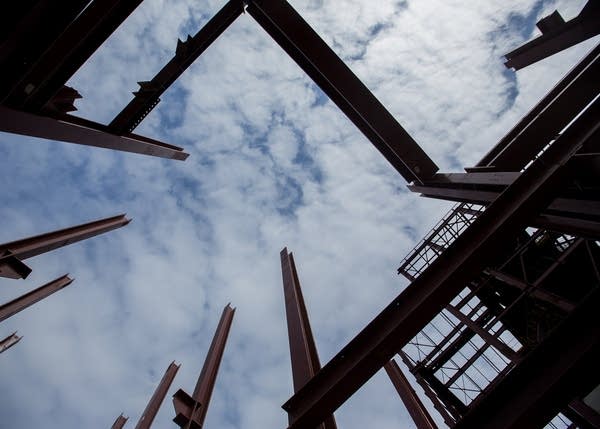Minnesota was making gains on its housing shortage — then coronavirus hit

Construction workers are considered essential workers under Minnesota's stay-at-home order, but a recent survey from the Federal Reserve Bank of Minneapolis found many firms are delaying projects and laying off workers.
Ron Wirtz, the regional outreach director for the Minneapolis Fed, conducted the survey last month. He told MPR News host Tom Crann that the coronavirus pandemic has injected uncertainty into an industry that had a strong start to the year and was making gains on the state’s housing shortage.
You can hear their conversation with the audio player above or read it below. It has been lightly edited for clarity and length.
Late last month, you surveyed construction firms across the Upper Midwest. And at that time, how much work was still going on and how much had been canceled or put on hold?
First, if I can maybe take a step back, the end of 2019 and into 2020, we were really hearing quite positive news from the construction industry in Minnesota and in other states in the Ninth District, [which includes Montana, North and South Dakota, and parts of Wisconsin and Michigan]. There was a lot of optimism for 2020. And then starting in March, we started to hear some concerns about cancellations and things like that.
Create a More Connected Minnesota
MPR News is your trusted resource for the news you need. With your support, MPR News brings accessible, courageous journalism and authentic conversation to everyone - free of paywalls and barriers. Your gift makes a difference.
We partnered with a number of construction organizations to reach out to members, and we heard from 550 construction firms. And yes, we did hear that a lot of firms are delaying projects for a variety of reasons.
What reasons are the firms are citing?
The coronavirus and the uncertainty around it was the driver of most of the delays, but we were also hearing about some additional supply chain disruptions because of the coronavirus.
We're also hearing that because of the shelter-in-place guidelines that are in place in Minnesota, a lot of government workers are also not working or are working at home. Some of the things that they need to do in order to keep projects moving, they might not be as efficiently [at home]. They may not have access to records.
Inspectors might not be able to go on site in order to look at a project and approve it. I think what we're finding is that that efficiency of permitting and inspections at the local level varies pretty widely.
Is there a particular kind of construction project that has been hardest hit?
What we saw very persistently across all of the associations was that all of their members were seeing some level of delay. There was a little bit more in certain ones, like we saw a little bit more delay among the homebuilders and maybe a little bit less among utility contractors.
There has been a lot of attention on the housing shortage, particularly affordable housing in Minnesota. What do you think the long-term implications are going to be here?
I think we were starting to really see some nice momentum toward the end of the year and into this year in terms of new homes being built. Data from Housing First Minnesota suggested that we really were seeing a nice increase in overall units. And this is clearly throwing a wrench into that, especially when you talk about affordable housing.
The underlying financing of that and the margins that are built into those are generally modest to begin with. And given the crisis that we're in now, I think the uncertainty certainly doesn't help the underlying economics of those projects.
But more broadly, to get any units built, I think home builders are still trying to assess exactly what the future looks like. And I think that's really the biggest issue here right now. There's simply a lot of uncertainty going forward, and uncertainty really is bad for business.
The big $2 trillion COVID-19 stimulus package has been passed and signed. It includes a lot of help for business. Do you think it'll make much of a difference when it comes to construction?
That's really hard to say. The package just got passed. I think right now businesses are hopeful, and I think that that's about what I would be able to tell you right now.